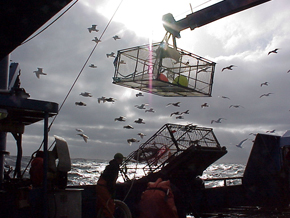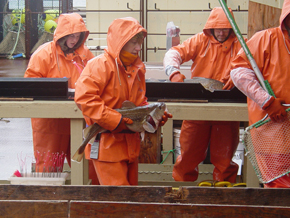

FIT Research Projects: Pacific Cod Localized Depletion Study
 |
 |
One of the research efforts funded by the Steller
Sea Lion Research Initiative is a field study of localized depletion in Pacific cod. This study is being conducted by the Alaska Fisheries
Science Center in the portion of the southeast Bering Sea known as “cod
alley”, on the northwest side of Unimak Pass. The exact study
location and location of pots fished for Pacific cod in 2002 and 2003
can be found here. This area has
historically been the source of a large fraction of the Bering Sea cod
harvest; the intensive trawling that occurs here during the winter cod
season is being used to test the hypothesis that heavy fishing may
create a localized depletion in the abundance of groundfish that are
eaten by Steller Sea Lions.
The study uses pot catch of cod with a
fixed fishing method as an index of local abundance. Because pot data
have a much lower variance than trawl data and the number of samples
obtained is larger, it is hoped that the pot-fishing study can provide
results suitable for statistical testing of whether or not a measurable
localized depletion occurs. Tagging of cod for tracking movement
patterns, development of scientific pot sampling gear, and collection of
biological specimen data are also going on as part of the study. This
study was presented to the North Pacific Fisheries Management Council (NPFMC) in fall of 2002. The
NPFMC approved
a small special closure area near Cape Sarichef to allow this study to
be conducted; the closure is in effect from March 15-31 for 2003 through
2006. The first run of the experiment was conducted in winter 2003.
Bad weather and mechanical problems resulted in a very small data set
for this year; results did not indicate a depletion effect but are not
considered conclusive. The experiment will be repeated in January and
March 2004.
Contact
For more details on the results summarized above,
see the documents below or contact M. Elizabeth Conners, liz.conners@noaa.gov, (206) 526-4465 or Peter Munro, peter.munro@noaa.gov, (206) 526-4292
|